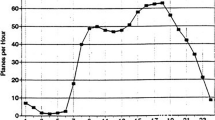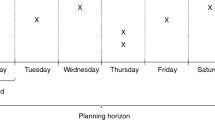Abstract
We consider a problem of scheduling in a multi-class network of single-server queues in series, in which service times at the nodes are constant and equal. Such a model has potential application to automated manufacturing systems or packet-switched communication networks, where a message is divided into packets (or cells) of fixed lengths. The network is a series-type assembly or transfer line, with the exception that there is an additional class of jobs that requires processing only at the first node (class 0). There is a holding cost per unit time that is proportional to the total number of customers in the system. The objective is to minimize the (expected) total discounted holding cost over a finite or an infinite horizon. We show that an optimal policy gives priority to class-0 jobs at node 1 when at least one of a set ofm−1 inequalities on partial sums of the components of the state vector is satisfied. We solve the problem by two methods. The first involves formulating the problem as a (discrete-time) Markov decision process and using induction on the horizon length. The second is a sample-path approach using an interchange argument to establish optimality.
Similar content being viewed by others
References
D. Bertsekas,Dynamic Programming and Optimal Control, Vol. II (Athena Scientific, Belmont, Massachusetts, 1995).
H. Chen, P. Yang and D. Yao, Control and scheduling in a two-station queueing network: optimal policies and heuristics,Queueing Systems 18 (1994) 301–332.
P.B. Chevalier and L.M. Wein, Scheduling networks of queues: heavy-traffic analysis of a multistation closed network,Oper. Res. 41 (1993) 743–758.
R. Hariharan, Routing and scheduling in queueing networks, Ph.D. Dissertation, Department of Operations Research, University of North Carolina, Chapel Hill (1991).
R. Hariharan, Scheduling in a multi-class queueing network: A sample-path approach, AT&T Bell Laboratories Technical Memorandum (1992).
J.M. Harrison, Brownian models of queueing networks with heterogeneous customer populations, in:Stochastic Differential Systems, Stochastic Control Theory and Applications, eds.W. Fleming and P.L. Lions (Springer, New York, 1988) pp. 147–186.
J.M. Harrison and L.M. Wein, Scheduling networks of queues: heavy-traffic analysis of a simple open network,Queueing Systems 5 (1989) 265–280.
J.M. Harrison and L.M. Wein, Scheduling networks of queues: heavy-traffic analysis of a two-station closed network,Oper. Res. 38 (1990) 1052–1064.
C.N. Laws and G.M. Louth, Dynamic scheduling of a four-station queueing network,Prob. Eng. Inform. Sci. 4 (1990) 131–156.
Z. Liu, P. Nain and D. Towsley, Sample-path methods in the control of queues,Queueing Systems 21 (1995) 293–336.
M.S. Moustafa, Scheduling in a multi-class network, Ph.D. dissertation, Program in Operations Research, North Carolina State University, Raleigh (1987).
M. Puterman,Markov Decision Processes: Discrete Stochastic Dynamic Programming (Wiley, New York, 1994).
M. SchÄl, Conditions for optimality in dynamic programming and for the limit ofn-stage optimal policies to be optimal,Z. Wahrscheinlichkeitstheorie verw. Gerb. 32 (1975) 179–196.
S. Stidham and R. Weber, A survey of Markov decision models for control of networks of queues,Queueing Systems 13 (1993) 291–314.
L.M. Wein, Optimal control of a two-station Brownian network,Math. Oper. Res. 15 (1990) 215–242.
L.M. Wein, Scheduling networks of queues: Heavy-traffic analysis of a two-station network with controllable inputs,Oper. Res. 38 (1990) 1065–1078.
L.M. Wein, Scheduling networks of queues: Heavy traffic analysis of a multistation network with controllable inputs,Oper. Res. 40 (1992) S312-S334.
Author information
Authors and Affiliations
Additional information
The research of this author was supported by the National Science Foundation under Grant No. DDM-8719825. Any opinions, findings, and conclusions or recommendations expressed in this material are those of the authors and do not necessarily reflect the views of the National Science Foundation.
Rights and permissions
About this article
Cite this article
Hariharan, R., Moustafa, M.S. & Stidham, S. Scheduling in a multi-class series of queues with deterministic service times. Queueing Syst 24, 83–99 (1996). https://doi.org/10.1007/BF01149081
Issue Date:
DOI: https://doi.org/10.1007/BF01149081




